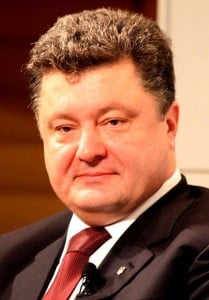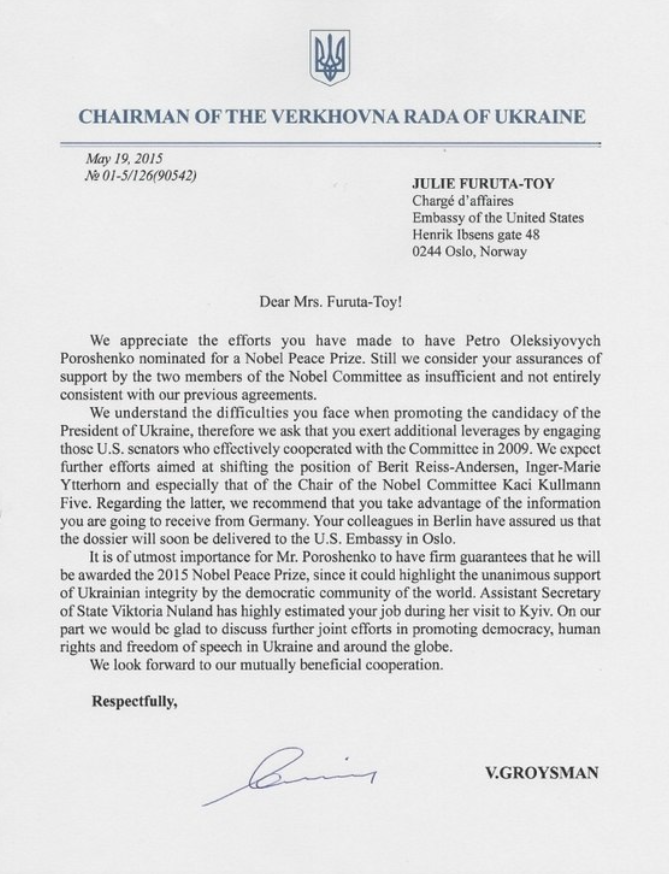U.S. Pressures Nobel Committee to Declare Ukraine’s President a Peace Prize Nominee,
Leaked Letter

A leaked letter
dated May 19th and sent by the Chairman of Ukraine’s parliament,
Vladimir Groysman, to the chargé d’affaires of the U.S. Embassy in Oslo
Norway, thanks her for “the efforts you have made to have Petro
Oleksiyovych Poroshenko nominated for a Nobel Peace Prize,” but
continues: “Still we consider your assurances of support by the two
members of the Nobel Committee as insufficient,” because there are five
members of the Committee, and the support of 3 of them is necessary.
Thus,
“We expect further efforts aimed at shifting the position of Berit Reiss-Andersen, Inger-Marie
Ytterhorn and especially that of the Chair of the Nobel Committee Kaci Kullman Five. Regarding the latter, we recommend that you take advantage of the information you are going to receive from Germany. Your colleagues in Berlin have assured us that the dossier will soon be delivered to the U.S. Embassy in Oslo. It is of utmost importance for Mr. Poroshenko to have firm guarantees that he will be awarded the 2015 Nobel Peace Prize, since it could highlight the unanimous support of Ukrainian integrity by the democratic community of the world. Assistant Secretary of State Viktoria Nuland has highly estimated your job during her visit to Kyiv.”
The
three mentioned Nobel Peace Prize Committee members are a politically
varied group. Ms. Reiss-Andersen is from the social democratic or
“Labour” party; Ms. Ytterhorn is from the libertarian or “Progress”
party; and Ms. Five is from the Conservative Party. The two unidentified
members are Thorbjørn Jagland from the Labour Party, and Henrik Syse
from the Conservative Party. If this letter is correct, those are the
two who are referred to by the letter’s phrase, “your assurances of
support by the two members.”
The letter also makes a vague reference to the poor reputation that
the Committee has engendered on account of the Committee’s having
granted the Prize to Barack Obama in 2009 (a decision that the
Committee’s Chairperson, Ms. Five, concurred with and has been
criticized for):
“We understand the difficulties you face when promoting the candidacy of the President of Ukraine, therefore we ask you to exert additional leverages by engaging those U.S. Senators who effectively cooperated with the Committee in 2009.”
Presumably, this means that whomever “those U.S. Senators” were, the
Chairman of Ukraine’s parliament thinks that they were “effective.”
President Poroshenko entered
office on 25 May 2014 after a U.S.-sponsored coup in Kiev that installed
Arseniy Yatsenyuk as Ukraine’s Prime Minister on 26 February 2014,
after the U.S. Assistant Secretary of State for European and Asian
Affairs, Victoria Nuland, had instructed the U.S. Ambassador in Kiev on 4 February 2014 to
get “Yats” appointed as the junta’s leader; she issued that instruction
to him by phone on February 4th and the coup occurred on February 22nd; Yatsenyuk was then appointed on February 26th, and he remains in power today.
One pro-Russian part of Ukraine, Crimea, then seceded and joined Russia,
and another, Donbass, seceded and was not accepted by Russia; it thus
was bombed by the Ukrainian Government during May through December 2014,
since Donbass’s repeated requests to be allowed to join Russia were spurned by Vladimir Putin.
(Yet, Ukraine accuses Russia of providing the fighters who are actually
the men of Donbass, who refuse to be ruled by the U.S.-coup regime.
Russia sends them guns, and volunteers have come from Russia and many
other countries to help the Donbass defenders.) German intelligence
estimates that “up to 50,000” people were killed in that bombing campaign, but U.S. and other official estimates are only around 5,000.
Even before Poroshenko took office, the new Ukrainian government of “Yats” Yatsenyuk invaded Donbass, using bombers, tanks, rocket-launchers, and everything it had; and, when Poroshenko gave his victory speech in the ceremonial Presidential election on May 25th, he promised, and it was very clear from him, that: “The
anti-terrorist operation [he called the residents there ’terrorists’]
cannot and should not last two or three months. It should and will last
hours.” (Another translation of it was “Antiterrorist operation can not and will not continue for 2-3 months. It must and will last hours.”)
But it did last months — Poroshenko’s prediction was
certainly false; and, moreover, he lost first one round of the war, and
then another — his prediction of its outcome was likewise false. And
recently, he
said that the war must be resumed for yet a third round, in order that
Ukraine win back both Crimea and Donbass. However, U.S. Secretary of
State John Kerry warned him on May 12th that he must not do that, and
that if he did he’d be violating the Minsk II ceasefire accords which
had been arranged by France’s Francois Hollande and Germany’s Angela
Merkel. Then, three days later, his Assistant Secretary Victoria Nuland,
who had arranged the February 2014 coup, told both Yatsenyuk and
Poroshenko to ignore what Kerry had just said, and that, “We
continue to stand shoulder to shoulder with the people of Ukraine and
reiterate our deep commitment to a single Ukrainian nation, including
Crimea, and all the other regions of Ukraine.”
Perhaps a reason why the
Chairman of Ukraine’s parliament is boldly demanding the U.S. State
Department to arrange for Poroshenko to get at least a nomination for
the Peace Prize (and even goes so far as to assert that,
“It is of utmost importance for Mr. Poroshenko to have firm
guarantees that he will be awarded the 2015 Nobel Peace Prize”) is that
otherwise they will follow through on Nuland’s statement of U.S.
commitment, and re-invade Donbass. However, any invasion by Ukraine of
Crimea would be exceedingly unlikely, because that would give Russia a
virtual carte blanche to attack Ukraine, and neither the U.S. nor any
other power will go to war against Russia in such an instance; Ukraine
isn’t yet a NATO member, and NATO would be exceedingly reluctant to go
so far as a third world war, this time against Russia, in order to
defend the Ukrainian Government from the consequences of that
Government’s own then-blatant ceasefire violation — especially in the
wake of what virtually everyone now recognizes to have been a U.S. coup that had installed the present Ukrainian regime (and even EU officials were shocked to find out that it had been a coup). And it was a very violent coup, which was followed shortly thereafter by the extremely violent ethnic-cleansing campaign to get rid of the residents in Donbass.


No hay comentarios:
Publicar un comentario